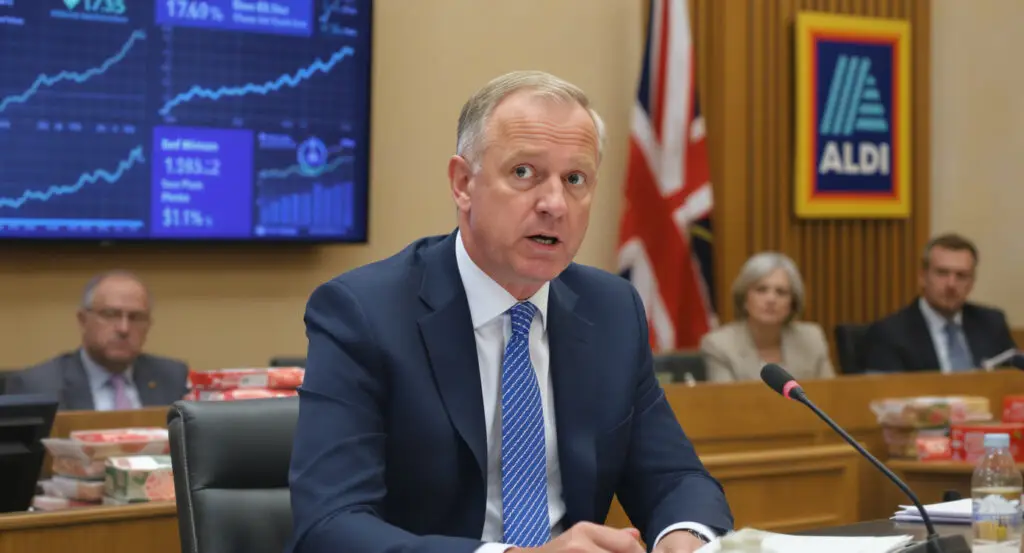Aldi Chief Executive Warns Budget Policies May Drive Food Inflation
Giles Hurley, the CEO of Aldi UK, warned that more cost increases from the government’s budget could directly raise the prices of food in supermarkets. He said that the effects of past National Insurance increases and new packaging rules had already made their way to store shelves across the country.
Hurley told lawmakers to think carefully about the effects of their decisions, saying that policies aimed at employers could lead to higher prices for consumers during times of inflation. The Treasury said that controlling inflation, being fiscally responsible, and making sure that economic growth helps working people as a whole are still the most important things in the budget.

Rising Operating Costs Pressure Aldi Profits Despite Growing Sales
Aldi’s sales went up a little bit to £18.1 billion, but its profits fell by more than 20% to £435.5 million. Hurley said that profit pressures come from lower prices, more money spent on infrastructure, and higher wages for workers, as well as higher taxes and regulatory costs.
This year, the company has already spent £300 million to keep prices low for basic groceries while costs keep going up. Even though they tried, prices for basic goods like beef mince went up a lot, showing how hard it is for supermarkets to keep prices low when costs go up.
Beef and Commodity Prices Add Pressure to Household Grocery Bills
Experts in retail say that the price of beef mince has gone up from £3.79 earlier this year to more than £5 at major supermarkets across the country. Hurley said that the increases were due to cattle prices going up by 30% and herd sizes getting smaller, which made it even harder for people to make ends meet.
Rising prices for cocoa, coffee, and olive oil, in addition to meat, make food supply chains around the world less stable. Even though some categories are stabilizing, high input costs are still a problem. This makes it harder for both retailers and households to lower inflation in the long term.
Recommended Article: US Inflation Jumps With Tariffs as Fed Signals Possible Cuts
Domestic Policy Decisions Contribute to Persistent UK Food Inflation
Hurley said that policies that were specific to the UK played a big role in keeping inflation high compared to other developed economies in recent years. New rules about packaging and higher National Insurance rates made things even harder for British food businesses right now.
According to Eurostat, food prices in the UK rose faster than in the rest of the EU, with a rate of 4.9% in July compared to 3.9% in the EU. Hurley stressed that political decisions made in the US could make inflation worse, making it even harder for consumers as global economic pressures rise.
New Packaging Rules Expected To Add Billions In Extra Costs
The Bank of England has said that packaging taxes could raise prices a lot, which could mean that supermarket prices go up until the fall of 2025. Starting next month, food and drink businesses will have to pay an extra £1.1 billion in costs, according to industry groups.
The Food and Drink Federation says that food prices could rise by 5.7 percent by December, but they will slowly go down and stay high until 2026. Employers are facing minimum wage increases at the same time, which makes their financial problems even worse and threatens both affordability and industry profitability across the UK.
Aldi Calls for Government Support to Strengthen Farming Sector
British agriculture needs to be more resilient, grow its own food, and rely less on unpredictable imports to control inflation in the long term. The government should ensure stable policies for struggling rural producers, encouraging investment.
Helping farmers can prevent food prices from rising too much, making the food supply chain more stable and beneficial for businesses and consumers. Collaboration between the government, agriculture, and retail is necessary to strengthen Britain’s food security strategy.
Aldi Expansion Plans Continue Despite Challenging Market Conditions
Aldi is still committed to expanding in the UK, despite rising prices. They plan to open eighty new stores in the next two years with a £1.6 billion investment. The store has 1,060 locations right now, which shows how hard it is to compete while keeping operational costs in check.
Expansion aims to give people more affordable shopping options, which fits with Aldi’s plan to keep offering great value to cost-conscious families all over the country. Aldi wants to grow its footprint in the UK retail market to help deal with inflation, increase its market share, and make itself more competitive in the long term.























